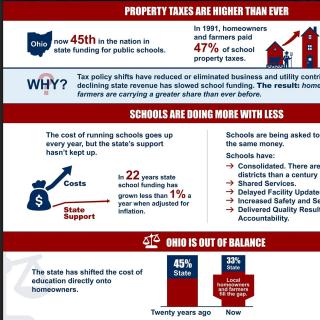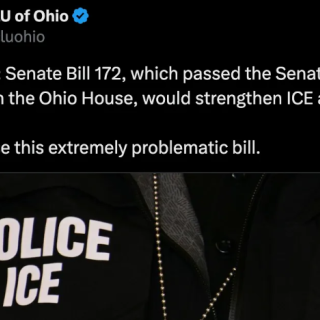Advertisement
This year’s crop of Columbus School Board candidates may be the most distinguished in the city’s history. Those running include Eric Brown – former Chief Justice of the Ohio Supreme Court and 15-year school board member at Mayfield City Schools; Mary Jo Hudson – former Columbus City Council member and former Director of the Ohio Department of Insurance; Jim Hunter – a Harvard graduate; Bernadine Kent, former Columbus City Schools vice principal, teacher and the key whistleblower on two of the school district’s recent scandals; Tina Pierce – former college professor and administrator, and current educational consultant; Ben Tyson – Senior Manager of Community Relations at Easton Town Center; Robert Sharrah – internal auditor and fraud investigator; and the two incumbents Gary Baker and Shawna Gibbs.
In all, ten candidates are running and eight will advance past the May 5 primary. The key endorsement in past Columbus School Board primaries has been that of the Franklin County Democratic Party. Democratic Party Chair Bill Anthony announced that the party would not be endorsing in this year’s primary.
Plagued by recent scandals involving “data-rigging” that created false accomplishments for the district and criminal indictments over vendors’ abuse of No Child Left Behind funds earmarked for low-income students, the school system is increasingly under criticism from citizens. The last school levy went down in an overwhelming defeat and in that election year two of the three incumbents lost.
At a March 19 public forum, Reverend Joel King asked the candidates, “Why should I vote for you?”
Brown stated that he would govern with “integrity” and as a former judge he had “seen the failure of the school system up close.” Gibbs, an incumbent, stressed that the 1.3 billion dollar school budget is the largest in central Ohio – bigger than the City of Columbus’ budget. She promised she would hire the best people and “put kids first.” Hudson, who was recently appointed to the Board, stressed “accountability and transparency.” She insisted that the governance model must be “accountable to the community.”
The low-key Hunter said his “passion” was the reason to vote for him. Kent emphasized her history of whistle-blowing and fighting to keep the school board accountable. She argued that she is best qualified to rebuild trust in the community. Tyson stated that his experience as a black male from a single-parent family coupled with his community involvement makes him an ideal candidate.
When pressed for solutions, Brown noted that the schools would only succeed if there was increased involvement from churches and law enforcement, but said the key partnership must be between the parents and school officials. Gibbs referenced the “school-to-prison” pipeline and stressed that the school system was moving towards increased cultural competency that would provide fair and equitable discipline. Hudson proposed that the school system needed to partner with the Compact involving the Ohio State University medical center and City of Columbus directing re-development on the near east side. She suggested tying education to the job openings in the medical field in that area.
Kent, echoing the theme of discipline, agreed that there is a bias toward harsher discipline toward black males in the district and they are erroneously perceived to be disruptive and disrespectful. Pierce suggested that education “must be seen as a social justice issue” and that the primary goal for improving schools should be “input from community members and parents.” She also mentioned individual school “councils” to oversee the school and provide recommendations.
Sharrah did not believe it made sense to suspend students and send them home when in today’s society most have parents at work during the day. He holds that those who are disruptive should be kept under school supervision and provided with “positive role models.” Tyson stated that “poverty was at the root” of most of the schools’ problems. He thinks that students in that situation must be taught that “life is about responsibility.” He suggested that the school district duplicate programs like City Year and Junior Achievement.
The most controversial question during the forum was the issue of “policy governance” – a model of school board management that essentially turns elected officials into rubber stampers for the superintendent and professional administrators. This model is widely thought to have led to the recent Columbus City Schools scandals. Tyson vowed if elected he would insist on “oversight of every program.” He explained: “You can’t make a good decision without every piece of information.” Sharrah pointed out that his background as an internal auditor and fraud investigator has enculturated him in demanding the necessary information for him to make an educated decision.
Hunter asserted that policy governance “defeated the purpose of an elected school board” and their oversight. Hudson dismissed it as a dated model of governance that does not serve an era of transparency. Gibbs, an incumbent who experienced policy governance as a school board member, said she always opposed it and is “unbought and unbossed.” Eight-year Board member Baker said that, “a publicly elected school board is the basis of democracy” and “if public education is in peril then our country is in peril.”
Kent stressed that while the others were talking about improvements to the school system, she was the only one during that period risking arrest by directly challenging the school board under policy governance. She ended up being labeled a “chronic complainer” on a police blacklist. Kent alerted State Auditor David Yost to the misappropriation of school board funds to tutoring centers and provided the initial information documenting the scandal.
Pierce denounced that policy governance model as one that incorrectly places all the power in the hands of the administrators and her solution is to “open up the Board meetings.” A telling comment from Pierce at the end warned voters to be careful who is controlling the historical narrative and that “narrative is important.”
Only two candidates will fail to emerge from the primary to run in the general election. One, Brian Bainbridge, is publicly inviting defeat by not appearing at forums and claiming he is a non-campaigning placeholder for the Republican Party.
With the future direction of the Columbus City Schools at stake, the forum provided provocative viewpoints and solutions that will hopefully carry into the fall election.
Bob Fitrakis was a School Board candidate in 2003 and was an attorney for Bernardine Kent regarding the school board scandal.
This article was updated on April 4, 2015




